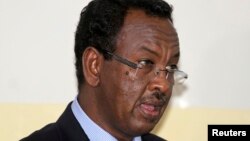Lawmakers in Somalia have ousted the prime minister, ending a year of rare stability atop that country's government.
Prime Minister Abdi Farah Shirdon lost a no-confidence vote in parliament Monday by a tally of 184 to 65.
Shirdon had battled for three weeks to keep his job, after President Hassan Sheikh Mohamud asked him to resign. The men had been odds over a planned Cabinet reshuffle.
In an interview with VOA’s Somali Service, the U.N. special representative to Somalia, Nicholas Kay, said the vote shows that Somalia's institutions are "coming of age."
"This is a difficult political situation," he said, "but I'm pleased to see that everybody has acted responsibly and calmly, and in the end parliament has conducted a perfectly normal piece of business, a vote of confidence/no-confidence," said Kay.
Kay also urged Somali leaders to name a new prime minister quickly to keep the country moving toward stability.
The president and prime minister came to power a little more than 12 months ago as part of a U.N.-backed process to give Somalia a stable central government after more than two decades of chaos and conflict.
Shirdon was a political newcomer at the time, having previously worked as a businessman in Kenya.
The country has enjoyed relative peace and a budding prosperity since then, though militant group al-Shabab continues to carry out periodic attacks in the capital, Mogadishu.
Previous Somali governments often fell apart because of infighting - a situation that hampered the government's ability to defeat insurgents and exert authority.
Al-Shabab was pushed out of major cities mainly by African Union troops.
Even now, the Mohamud government has found it hard to settle power struggles within Somalia, where many towns are under the effective control of various clans, militia groups or al-Shabab.
Prime Minister Abdi Farah Shirdon lost a no-confidence vote in parliament Monday by a tally of 184 to 65.
Shirdon had battled for three weeks to keep his job, after President Hassan Sheikh Mohamud asked him to resign. The men had been odds over a planned Cabinet reshuffle.
In an interview with VOA’s Somali Service, the U.N. special representative to Somalia, Nicholas Kay, said the vote shows that Somalia's institutions are "coming of age."
"This is a difficult political situation," he said, "but I'm pleased to see that everybody has acted responsibly and calmly, and in the end parliament has conducted a perfectly normal piece of business, a vote of confidence/no-confidence," said Kay.
Kay also urged Somali leaders to name a new prime minister quickly to keep the country moving toward stability.
The president and prime minister came to power a little more than 12 months ago as part of a U.N.-backed process to give Somalia a stable central government after more than two decades of chaos and conflict.
Shirdon was a political newcomer at the time, having previously worked as a businessman in Kenya.
The country has enjoyed relative peace and a budding prosperity since then, though militant group al-Shabab continues to carry out periodic attacks in the capital, Mogadishu.
Previous Somali governments often fell apart because of infighting - a situation that hampered the government's ability to defeat insurgents and exert authority.
Al-Shabab was pushed out of major cities mainly by African Union troops.
Even now, the Mohamud government has found it hard to settle power struggles within Somalia, where many towns are under the effective control of various clans, militia groups or al-Shabab.






